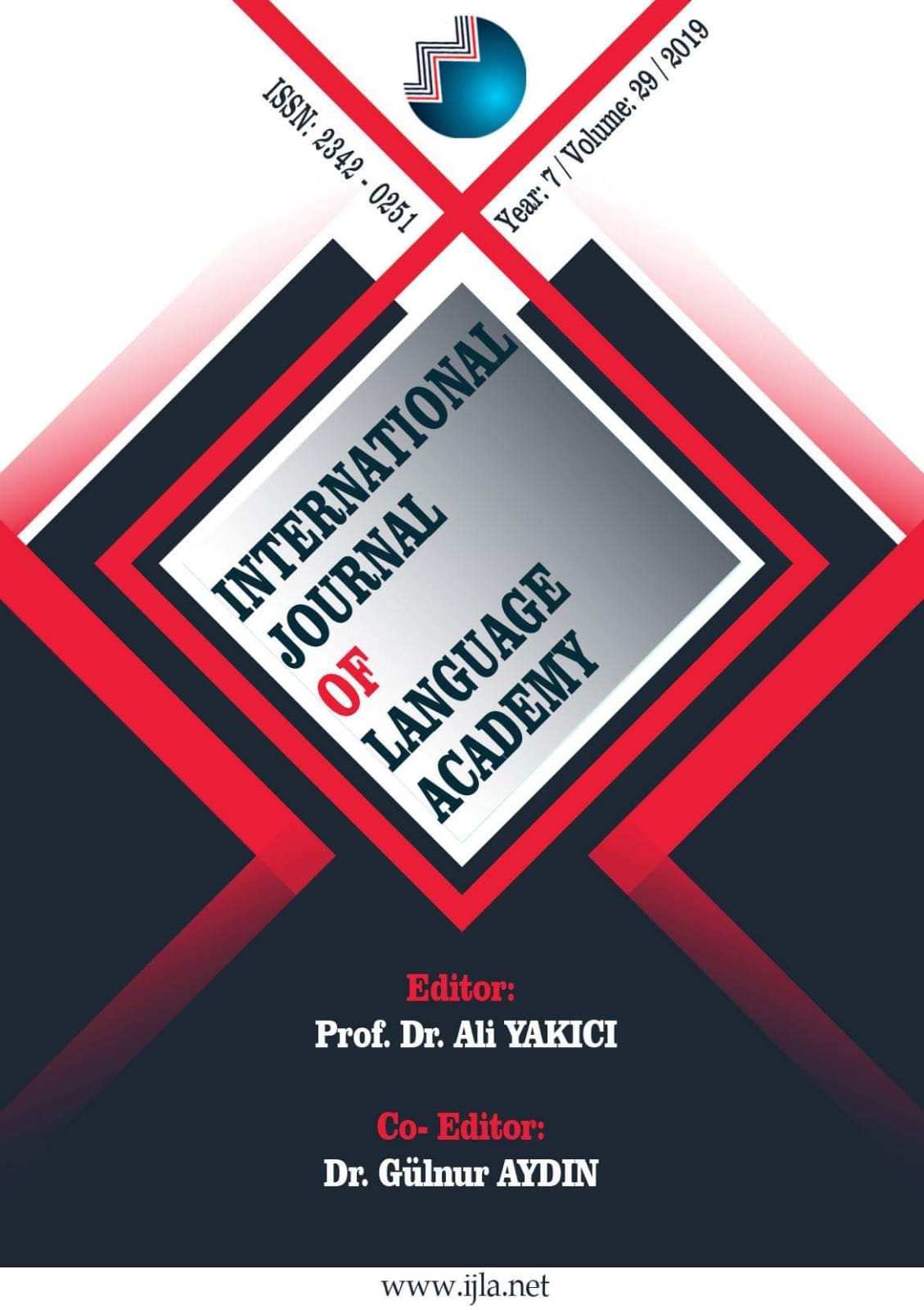Author :
Abstract
Kuramla ilgili bilgiler eğitime aktarılırken bunların uygulamada elde ettiğimiz verileri birleştirerek bazı nesnel ölçüler geliştirebiliriz. Türk dili ve düşüncesi yabancı dil ve kültürlerden olumsuz yönde etkilenmiştir. Bu etkileşim Türkçenin söz varlığı ve şekil özelliklerinde kolayca görülür. Dil topluma bir başkalık, başka türlü düşünme, davranma ve başka türlü yaşama özelliği verir. Toplumların dünyaya bakışları, insana verdikleri değerler farklılık gösterir. Toplumların madde ve insan arasında kurdukları dengeler veya tavırlar doğrudan dillerine yansır. Türk dilinin öğretiminde dil-düşünce ilişkisi zemini, Türkçe öğretim materyalinde eksik bırakılmıştır. Bu eksiklik Türk dilinin öğrenme, öğretme ve incelemelerindeki sorunlarını ortaya çıkartır. Yakın dönemde yazarlar başta olmak üzere toplumda genel olarak edilgen çatılı cümle sayılarında artmalar görülür. Bu artış toplumda düşünce ve kişilik değişmelerinin bir sonucu olarak ortaya çıkar. Bu sonuç bilinçli bir şekilde sürdürülen toplumu değiştirme çalışmalarının bir başarısı olarak ortaya çıkar.Kavram önce zihinde oluşur ve şekillenir sonra karşı tarafa iletilecek kalıplara dökülür. İşte bu kalıplara yani söz dizimine dökülme işlemi dilleri oluşturur. Bu kalıplar dilin düşünce sistemine göre oluşur. Bu oluşuma göre her dilin kendi sistemi ortaya çıkar. İfade edilemeyen ve dolayısıyla iletilemeyen bir kavramdan, bir düşünceden bahsedilemez.Türk dilini kendi düşünce sisteminden ortaya çıkan kuramlara göre değerlendirmek gerekir. Bu kuramlara uygun geliştirilen özgün yöntemlerle Türk dili öğretilirse kültür yozlaşmalarının ve dildeki yabancı
Keywords
Abstract
When transferring information about theory to education, we can develop some objective measures by combining their data with practice. Turkish language and thought were affected negatively by negatively by foreign languages and cultures. This interaction is easily seen in the vocabulary and shape features of Turkish Language gives the society the ability to be different, to think differently, to act and to lived differently. The societys’ views on the world and the values they attach to human beings vary. The balances or attitudes that societies establish between matter and man are directly reflected in their language.When transferring information about theory to education, we can develop some objective measures by combining their data with practice. Turkish language and thought were affected negatively by foreign languages and cultures. This interaction is easily seen in the vocabulary and shape features of Turkish Language gives the society the ability to be different, to think differently, to act and to lived differently. The societies’ views on the world and values they attach to human beings vary. The balances or attitudes that societies establish between matter and mana re directly reflected in their language.The basis of the relationship between language and thought in the teaching of Turkish language was left in complete in Turkish teaching material. This deficiency reveals the problems of Turkish language in learning, teaching and studying. Recently, there has been an increase in the number of passive roofed sentences in the society, especially the authors. This increase occurs as a result of changes in thought and personality in society. This result emerges as a success of efforts to change the society consciously.Concept is formed and shaped firts in the mind and then poured in to the molds to be transmitted toothers. Spilling in to these patterns, that is, syntax, creates languages. These patterns are formed according to the language’s thought system. According to this formation, aech language has its own system. A concept, an idea that can not be expressed and there fore can not be communicated, can not be mentioned. The Turkish language should be evaluated according to the theories that emerge from its own system of thought. If the Turkish language is thought with original methods developed in accordance with these theories, it will be seen that culturaled generation and foreign effects in the language will be reduced.
Keywords
- Avcı, Y. (2008). Yapım eklerinin anlam merkezli sınıflandırılmasına dair, VI, Uluslararası Türk Dili Kurultayı 20-25 Ekim, Ankara.
- Baltabayev, H. (2006) Nesir ve üslûp (Akt.Yusuf Avcı) İstanbul: Beta.
- Chomsky, N. (1964) Carrent issues in Linguistic Theory, Katz/Fcdor.
- Dilaçar, A. (1971). Gramer, tanımı, adı, kapsamı, türler, yöntemi, eğitimdeki yeri ve tarihçesi, TEDAY “Belleten” ,83- 145.
- Gelencik, R. (1993) Dil vs politika, Ankara: PE Yayınları.
- Hacıeminoğlu, N. (1991). Yapı Bakımından Fiiller, Ankara: Kültür Bakanlığı Yayınları.
- Hacıeminoğlu, N. (1992) Türk dilinin mantık sistemi ve kelime aileleri “Türk kültürü araştırmaları’', .Ankara, V.I.XXVHI/1-2.
- İzbul, Y. (1978-84) Dil/kültür dizgesi evrenselci - göreci tezler, Hacettepe Üniversitesi- Kültür Antropolojisi Ders Notları, Ankara.
- Karahan, L. (2004). Türkçede söz dizimi 7. Baskı. Ankara.
- Kaya, Y. M. (1992) Türklük şuuru ve Türk dili, Ocak Yay. Ankara s.25.
- Korkmaz, Z. (1995). Türk dili üzerine araştırmalar, Ankara.
- Lenin, V.I. (1976) Philosophical notebooks collected works, fourth printing progress publishers, Vol. XXXII, ?. 89, Moscov.
- Nesin, A. (1992). Bağımsızlık ve Türkçe, “ Çağdaş Türk Dili” Mart, Ankara.
- Saussure, F. (1949). Cours de linguistique generale, Paris.
- Vardar, B.(1982). Dilbilimin temel kavram ve ilkeleri, TDK, Ankara.





